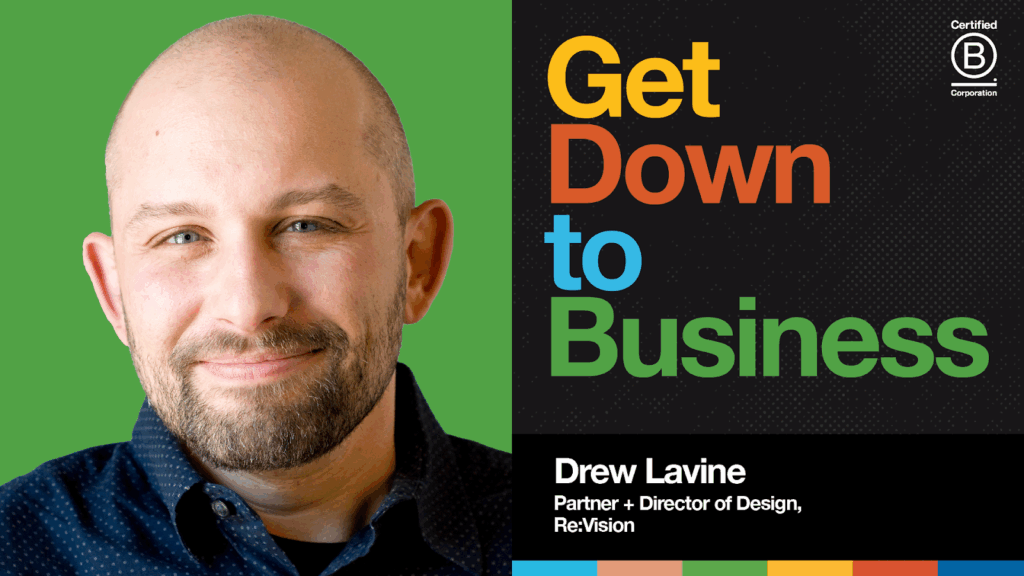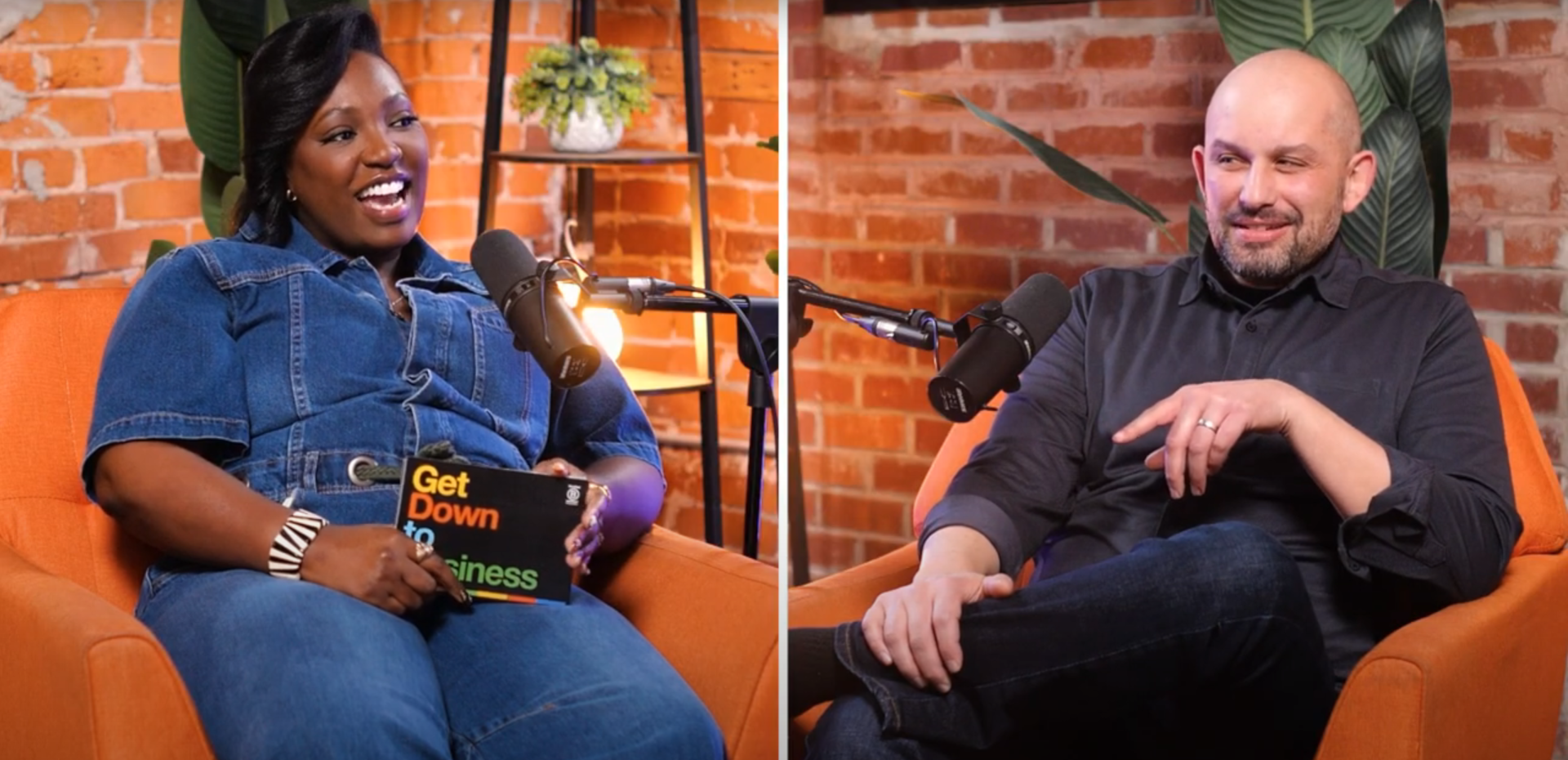Beyond Architecture: Redefining The Place of Sustainability in Architectural Designs with Re:Vision
August 12, 2025

Drew Lavine and Shawn Hogan deconstruct the place of environmental sustainability in modern architecture in the fourth episode of Get Down to Business: A B Corp Podcast. In Lavine and Hogan’s opinion, sustainability shouldn’t be the last consideration for architectural firms and building owners; it should be the conversation starter.
Environmental Sustainability Is a Win for All
“We’re building a more environmentally friendly world, but for whom?” —Shawn Hogan, Project Manager at Re:Vision.
The fourth episode of Get Down to Business features Drew Lavine, Partner & Director of Design at Re:Vision, and Shawn Hogan, Project Manager at Re:Vision. They sit down with podcast co-hosts Lauren Everett and Max Hayes to discuss how Re:Vision is helping its stakeholders build sustainability-conscious mindsets as its contribution to constructing a thriving community.
Re:Vision is an agile architectural firm in Philadelphia offering green and sustainability-focused architecture and performance consulting to individuals, business owners, and community leaders to restore balance between the natural, built, and social environment.
As one of the founding members of the B Corp community, Re:Vision earned its B Corp Certification in 2007. The company has long advocated for the B Corp movement through its in-house B Corp consulting for architectural firms. In Hogan’s words, being a B Corp means “aligning with best practices.”
B Corp Certification, The Missing Piece in Measuring Impact
For Re:Vision, becoming a B Corp felt like a no-brainer. Sustainability was already embedded in every company decision as a forerunner. Joining the movement meant finally having the metrics to validate this ethos while giving the company a more prominent seat in the Philadelphia business community (which Hogan notes is an active B Corp community).
“I think that, because we’re a mission-driven practice, from the very beginning of the founding of our practice, we had this mission to re-balance the relationship between the built and the natural in the social environment,” Lavine recalls.
Every sustainability-conscious company is looking for that missing piece to help validate their impact, and Hogan reveals that Re:Vision was lucky to find it early. B Corp Certification has not only helped them strengthen their impact business model, but it has also provided tools to measure their resource conservation efforts. Now, they’re helping others do the same.
The B Impact Assessment tool (BIA), which Lauren describes as a free, comprehensive digital tool for measuring a company’s overall social and environmental impact, has helped Re:Vision review its carbon footprint, waste management, water usage, supply chain sustainability, and product life cycle impact. Hogan notes it wasn’t all smooth sailing for Re:Vision.
Having joined close to one of Re:Vision’s many recertifications, he recalls that getting the receipts (data) together was tough. Several recertifications later, Re:Vision now uses an operational tracking system that simplifies its data gathering. Coupled with the BIA, which rates their performance and proffers areas for improvement, he now feels that maintaining a B Corp Certification has never felt easier.
More Than A Validation, The B Corp Certification Is A Moral Anchor
Lavine describes B Corp Certification as a “process that helps guide you forward.” When he became an owner at Re:Vision, his scope of how to approach sustainability in business broadened. What stands out about B Corp Certification, in Hogan’s opinion, is the fact that it’s not just aspirational; it’s also operational—that’s why prospective B Corps should consider their appetite for effort and cost.
For Re:Vision, the goal has always been to align every certification with its brand values and return on investment (ROI), even when consulting with other firms. Hogan notes that many of their clients feel vulnerable about sharing receipts on their impact performance with a third party. But at B Lab, obtaining certification isn’t the endgame. It’s about kindling a passion to want to do more. B Corp Certification can then be a scaffolding to help you scale.
In Lavine’s words, asking, “how can we take the values of our certification and align this right and understand this isn’t the right client for us?” is one of the benefits of being a B Corp. He adds that it’s empowering to say, “no, we’re not going to do this work…even though we want it.”
Re:Vision has created a vetting system for clients through the lens of their B Corp Certification. This process doesn’t mean rejecting clients who aren’t there yet, but rather helping those who are willing to take the leap.
How Re:Vision is Balancing Sustainability With The Demands of Business Reality
Corporate sustainability is ever-evolving. There are countless frameworks for tracking your environmental impact, but how do you know which is right for your business? Hogan notes that, as long as you have your receipts and are checking your calculations with an acceptable standard, you can track your progress in a spreadsheet.
The new version of the B Lab’s Standards provides a detailed framework and options for tracking your impact performance around climate action, environmental stewardship, and circularity. Hogan stresses that she’s excited to see a world that knows it’s responsible for its emissions and metrics, and is willing to collaborate to manage it.
The true ROI of measuring environmental impact isn’t better brand value; it’s the satisfaction of knowing your community is better off because of your contributions. “I think about all the children who will learn in buildings that we’ve designed and helped with LEED certification on. You know, what are they even going to go on to do? And we’ll never be able to measure that because we’ll never fully know,” says Hogan.
One of Re:Vision’s most recent commitments is teaching more community members about the technical aspects of sustainability and green building. In Lavine’s opinion, being part of the B Corp movement knocks you out of the inertia of complacency, pushing you to confront the real cost of doing business in a world that’s constantly changing.
Re:Vision is Nurturing A New Generation of Green Change-Makers
When people ask why they should care about LEED and living building challenges, Lavine’s answer is simple: “If you’re living in a building, yeah, you should care about this.”
At Re:Vision, advocating for sustainability isn’t just a job for top management. With the help of company-wide training initiatives, every Re:Vision staff member is learning to lead this conversation.
Even in job postings, Re:Vision is flying the B Corp flag and receiving feedback from applicants who want to know more about the movement. Hogan admits that she, too, was drawn to Re:Vision because the company was part of the B Corp story and a protagonist in Philadelphia’s sustainability and impact business community.
“I think that, especially with younger applicants, there’s a greater appetite than ever to align their values with where they work,” Lavine professes. In his mind, claiming to be a sustainable business isn’t a market differentiator anymore. You have to prove you’re one, preferably, with a certification like B Corp.
“To go through something as rigorous as B Corp [Certification], I think, is the key here,” says Lavine, because people want tangible proof. He concludes that “we all have a limited amount of time to give; a limited number of years to give, right? And if you want to make an impact, you know, going to work for a B Corp means a lot.”
Episode 4 of the Get Down to Business podcast, featuring Drew Lavine and Hogan Hogan of Re:Vision, is available across streaming platforms, accompanied by video on B Lab U.S. & Canada’s YouTube channel.
Ready to level up your climate strategies? Download B Lab’s Climate Action Impact Topic guide.
Copyright B Lab U.S. & Canada
Sign Up for our B The Change Newsletter
Read stories on the B Corp Movement and people using business as a force for good. The B The Change Newsletter is sent weekly.
